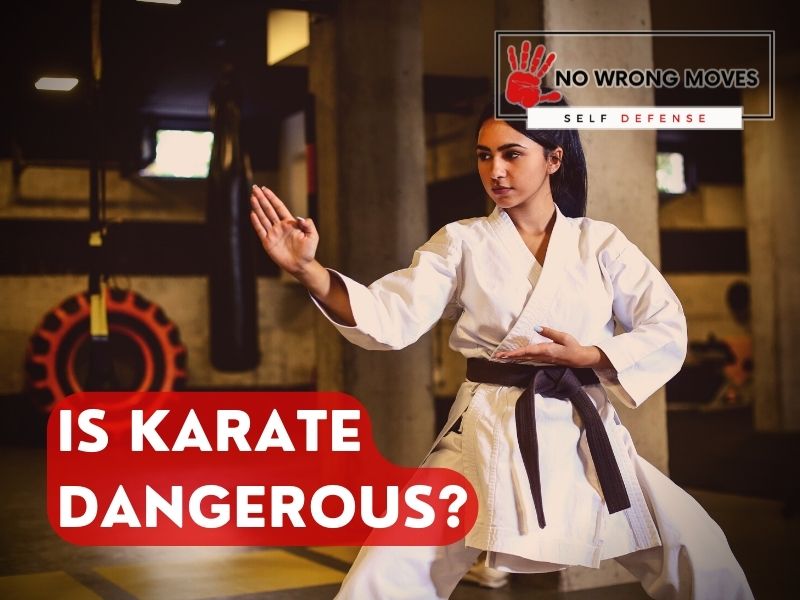If you've been considering getting into Karate for self-defense, you have probably wondered... 'Is Karate Dangerous?' The good news here is, you aren't alone! Many people ask themselves that before taking on martial arts as a hobby; it is a sound question! So, I've got all the facts right here for you. Let's get into it...

Karate is a martial art that has been practiced for centuries and has gained a lot of popularity in recent years.
Yet still, many people wonder if practicing Karate is safe, or if it carries significant risks of injury. While Karate can be physically demanding and involves contact with other practitioners, it is also a highly structured and disciplined activity that emphasizes safety and proper technique.
In this article, we will explore the potential risks associated with practicing Karate and provide some practical tips on how to stay safe and injury-free while training.
The Dangers Of Karate

Some of the dangers of karate include possible injuries to the neck, head, and other parts of the body. Helmets and other protective gear can help reduce the risk of these injuries. Some of the risks associated with karate training are dehydration, heat exhaustion, and heat stroke.
It is important to be properly hydrated before and during karate training. Some of the injuries that can occur during karate training include strains, sprains, and fractures. Some of the more serious injuries that have been reported include concussions, spinal cord injuries, and even death.
Karate is a physically demanding sport, and proper medical attention should be sought if an injury is sustained.
While the risks associated with karate training should not be taken lightly, the benefits of practicing this martial art far outweigh the dangers. Karate helps to develop discipline, self-confidence, and self-defense skills. It also provides a great workout and can be used as a form of stress relief.
Karate is a dangerous activity but with proper safety measures in place, the risks can be minimized. helmet protects your head from hits during training or in tournaments. Some people also use mouthguards to protect their teeth and gums.
Wearing protective gear can help reduce the risk of injuries but cannot completely eliminate them. Always consult with a doctor before starting any new physical activity.
Be sure to warm up properly before training and cool down afterwards. Most importantly, listen to your body and stop if you are in pain or feel dizzy or lightheaded. Never push yourself beyond your limits as this could lead to serious injury. With proper precautions, karate can be a safe and enjoyable way to stay fit and healthy.
The Most Common Injuries Sustained In Karate

If you're a Karate practitioner, you're likely aware of the risks associated with this contact sport. While Karate can offer numerous physical and mental benefits, it's essential to recognize and understand the six most common injuries you could face.
First on the list is a sprained ankle. This injury is the most prevalent among Karate practitioners and can result from landing awkwardly or getting kicked in the ankle.
Next up are strained muscles. Overuse or sudden, powerful contractions, such as blocking a punch, can cause muscle strains.
Knee injuries are also common and can include sprains, strains, and tears of the ligaments around the knee joint.
Another condition that frequently affects Karate practitioners is shin splints. This issue results from overuse of the shin muscles and can lead to pain and inflammation along the front of the lower leg.
Back injuries are also on the list of common Karate injuries. They can range from minor strains to more serious problems like disk herniation.
Finally, concussions are a risk for any contact sport, and Karate is no exception. It's essential to protect your head and take precautions to avoid this type of injury.
Additional Risks Involved When Practicing Karate

Another potential danger of Karate is the risk of contracting an infectious disease such as skin infections or staphylococcus infection.
These risks can be minimized by practicing good hygiene and making sure to clean and disinfect all training equipment regularly.
Practitioners of contact sports are especially at risk for contracting a communicable disease, as they often come in close physical contact with others during training and competitions.
Be sure to always shower and wash properly before and after training and to avoid sharing personal items such as towels or water bottles.
However rare they may be, it is still important to be aware of them.
How To Stay Safe When Practicing Karate

Always respect your opponent's abilities and grade. Don't attempt anything that drastically exceeds their level, as this may result in serious injury.
And while yes, practitioners should always push themselves to their very limits, that doesn't mean they should do that to the point of injury though.
Allowing yourself time adjust accordingly will help optimize safety during sessions whilst still allowing progress be made towards learning new skills/techniques
Taking the time to warm up, maintain a healthy weight, and become familiar with different techniques is essential for getting the most out of your sessions while avoiding injuries.
Conditioning your body through stretching exercises or light cardiovascular activities helps get you ready for any type of physical activity by loosening muscles and increasing blood circulation.
It's also important that you monitor what types of food intake depending on whether you need gain more muscle mass or lose weight in order to stay within a healthy range so as not put too much strain on certain areas during sparring sessions.
To prevent unnecessary stress from being placed onto specific parts of your anatomy, familiarize yourself with basic techniques such as guard passes, arm bars, chokes, etc.
This will help ensure that when these situations arise during rolls, you won’t panic but instead calmly react appropriately without getting injured.
By taking all these steps into consideration, you can be confident in your ability to fully commit yourself in training. You'll know that you are well-prepared, both mentally and physically, before engaging in any sort of physical activity
The Wrap-Up
So! While Karate can be a physically demanding sport that comes with the risk of injury, it is no more dangerous than other contact sports like football or basketball. With proper training, supervision, and safety measures in place, the risk of injury you receive can be minimized.
As with any physical activity, it is important to listen to your body and take necessary precautions to prevent injury. Ultimately, the benefits of practicing Karate, including improved physical fitness, self-discipline, and self-defense skills, can outweigh the risks.
So if you are considering practicing Karate, don't let fear hold you back. With the right mindset and approach, you can enjoy this sport and reap its many rewards while minimizing the risk of injury.
[author-box-jpx-fitness]
